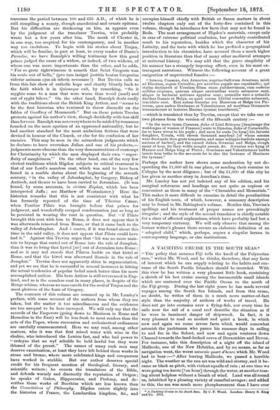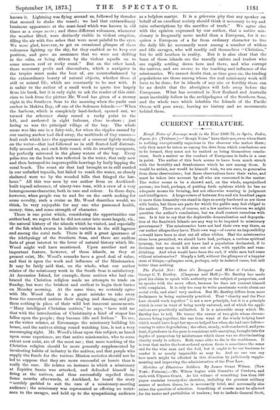A YACHTING CRUISE IN THE SOUTH SEAS.*
"THE policy that annexes Fiji tolls the knell of the Polynesian race," writes Mr. Wood, and he thinks, therefore, that any facts of interest which he can supply relating to the habits and cus- toms of the South Pacific Islanders should be recorded. With this view he has written a very pleasant little book, containing a sketch of his last cruise among the innumerable small islands which are scattered over the Pacific Ocean to the north of the Fiji group. During the last eight years he has made several voyages among the South Sea Islands, and from this cause, no doubt, he writes of them in a much more matter-of-fact style than the majority of authors of works of travel. He does not go into ecstasies over a flying-fish, nor every time he sails near the tail of a coral reef describe the situation as if he were in imminent danger of shipwreck. In fact, it is very pleasant to read so modest and quiet a book, in which now and again we come across facts which would somewhat astonish the yachtsman who passes his summer days in sailing to and fro in the Solent, and now and again ventures down Channel towards the land-locked coves of Dorsetshire and Devon. For instance, take this description of a night off the island of Mallicolo, one of the New Hebrides, and by no means, as far as navigation went, the worst mauvais quart d'heure which Mr. Wood had to bear :—" After leaving Mallicolo, we passed a horrible night. The weather as the sun set was wild and stormy, and it be- came as black as pitch, with violent squalls of rain ; at one time we were going ten knots [?an hour] through the water, at another toss- ing about helpless without a breath of wind. Land was all round us, inhabited by a pleasing variety of cannibal savages; and added to this, the sea was much more phosphorescent than I have ever • A Yachting Cruise in the South Seas. By C. F. Wood. London: Henry S. Bing and Co. 1875. known it. Lightning was flying around us, followed by thunder that seemed. to shake the 'vessel; we had that extraordinary luminous appearance at the mast-head which was known in old times as a corpo santo ; and three different volcanoes, whenever the weather lifted, were distinctly visible in violent eruption, filling the air with fine ashes that were most painful to the eyes. We were glad, however, to get an occasional glimpse of these volcanoes lighting up the sky, for they enabled us to keep our position, and gave an assurance that we were not drifting in the calm, or being driven by the violent squalls on to some unseen reef or rocky coast." But on the other hand, these necessary perils and discomforts, which a navigator in the tropics must make the best of, are counterbalanced by the extraordinary beauty of natural objects, whether those of still or animal life, which are constantly to be met with. It is unfair to the author of a small work to quote too largely from his book, but it is only right to ask the reader of this criti- cism to look from the picture Mr. Wood has given of a stormy night in the Southern Seas to the morning when the yacht east anchor in Makiva Bay, off one of the Solomon Islands :—" When" the harbour, which is completely land-locked, opened out, we turned the schooner sharp round a rocky point to the left, and anchored in eight fathoms, close in-shore ; just facing us was the principal village of the bay. The whole scene was like one in a fairy-tale, for when the ripples caused by our casting anchor had died away, the multitude of tiny canoes— frail craft which have the appearance of a crescent lightly resting on the water—that had followed us in still floated half distrust- fully around us, and each little vessel, with its swarthy occupants, lay perfectly mirrored in the glassy waters of the bay. Every palm-tree on the beach was reflected in the water, that only now and then betrayed its imperceptible heavings by lazily lapping the coral beach. The scant air that had brought us in still rustled in our unfurled topsails, but failed to reach the water, so closely sheltered were we by the wooded hills that fringed the har- bour." All this was seen by our, author from an Auckland- built topsail schooner, of ninety-two tons, with a crew of a very heterogeneous character, both in race and colour. In these days, ?aowever, when people run to and fro on the earth seeking for some novelty, such a cruise as Mr. W ood describes would, we think, be very enjoyable for any one who possessed health, money, time, and some strength of character.
There is one point which, considering the opportunities our author had, we regret that he did not enter into more largely, viz., the natural history of the islands which he visited, and especially of the fish which swarm in infinite varieties in the still lagoons and among the coral reefs. There is still a great ignorance of the ichthyology of the Southern Seas, and there are endless facts of great interest to the lover of natural history which Mr. Wood might well have mentioned. Upon another and an important feature, however, of these islands, as they at present exist, Mr. Wood's remarks have a good deal of value, and that is upon the work and influence of the Missionaries. It may be fairly said that, on the whole, what our author relates of the missionary work in the South Seas is satisfactory. At Ascension Island, for example, those natives who had em- braced the Christian religion made no attempts to trade on Sunday, but were the briskest and earliest to begin their barter on Monday morning. At the same time, we certainly agree with Mr. Wood that it is a great mistake to take away from the converted natives their singing and dancing, and give them nothing in place of their wild but innocent amusements. "Many intelligent Christian natives," he says, "have told me that with the introduction of Christianity a kind of stupor has fallen upon the people ; they become idle and listless." To see, as the writer relates, at Erromango the missionary building his house, and the natives sitting round watching him, is not a very encouraging sight. Mr. Wood's ideas upon this subject, as based upon some experience, are that native missionaries, who to some extent now exist, are of the most use ; that mere teaching of the Christian religion should be more generally supplemented by inculcating habits of industry in the natives, and that people who supply the funds for the various Mission societies should not be led to suppose that they are more successful or heroic than is really the case. He relates an instance in which a missionary at Espiritu Santo was attacked, and defended himself by firing at the natives, and thus successfully repelled them. Some months afterwards, at Auckland, he heard the story "terribly garbled to suit the ears of a missionary-meeting audience ; the missionary was represented as offering no resist- ance to the savages, and held up to the sympathising audience as a helpless martyr. It is a grievous pity that any speaker on , behalf of an excellent society should think it necessary to try and raise subscriptions by the sacrifice of truth." We agree also with the opinion expressed by our author, that a native mis- sionary is frequently more useful than a European, for it re- quires a European of a far from ordinary character to live the daily life be necessarily must among a number of witless and idle savages, who will readily call themselves "Christian," but be still heathen in reality. But it is also clear that the bane of these islands are the rascally sailors and traders who are rapidly settling down here and there, and who corrupt the natives, and are averse to the teaching and influence of the missionaries. We cannot doubt that, as time goes on, the trading populations are those among whom the real missionary work will have to be done, for in islands of any size or fertility there can be no doubt that the aborigines will fade away before the Europeans. What has occurred in New Zealand and Australia must inevitably follow in the archipelagoes of the Southern Seas, and the whole race which inhabits the Islands of the Pacific Ocean will pass away, leaving no history and no monuments behind them.































 Previous page
Previous page